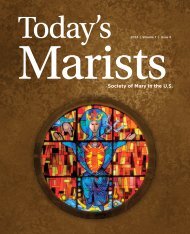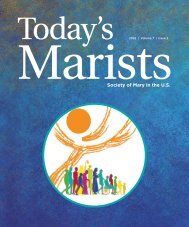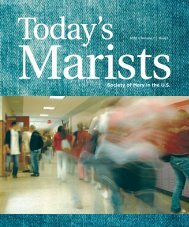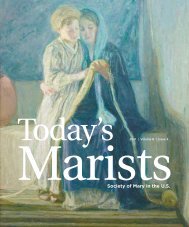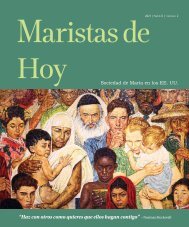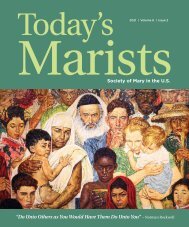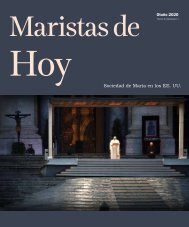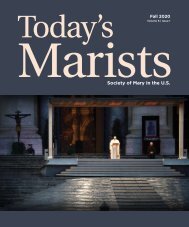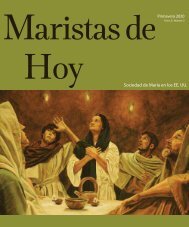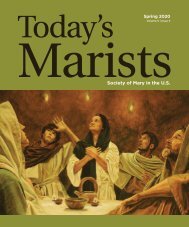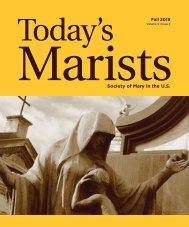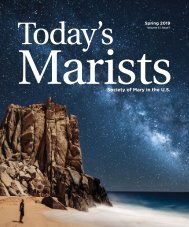Today's Marists 2024 Volume 8, Issue 2
Create successful ePaper yourself
Turn your PDF publications into a flip-book with our unique Google optimized e-Paper software.
Reconciliation:<br />
A Path to Peace in Interreligious Dialogue<br />
by Hermes Sabud, SM, Program coordinator, Interreligious and Intercultural Dialogue (IRICD) Program of the Marist Asia Foundation, Ranong, Thailand<br />
Interreligious dialogue is a collaborative<br />
approach to life where people from diverse<br />
religious faith traditions respectfully<br />
establish connections and build friendships.<br />
When people begin to establish friendships,<br />
trust is gradually initiated and nurtured. As<br />
relationships develop, we become aware of<br />
the uniqueness of the other. There are times<br />
when it is difficult to accept and appreciate<br />
certain aspects of another person. However,<br />
as soon as trust is established, there will be<br />
times when things are shared openly and<br />
honestly. In interreligious dialogue, genuine<br />
peace is achieved through reconciliation.<br />
The present situation of the world seems to<br />
lack hopeful indicators for reconciliation and<br />
achieving peace. However, for those who<br />
are dedicated to promoting and building<br />
reconciliation, peace, and harmony with<br />
others, it is achievable. Perhaps for others<br />
who have experienced the difficulties,<br />
discrimination and humiliation inflicted<br />
by others who have power, the conviction<br />
mentioned above might be painful to hear.<br />
Genuine reconciliation is the only way to<br />
achieve peace for those who believe and<br />
work in interreligious dialogue.<br />
Since 2006, the <strong>Marists</strong> have been working<br />
in Ranong, Thailand. Ranong is situated<br />
on the western side of the Andaman Sea<br />
and is bordered by Kawthaung, Myanmar’s<br />
southernmost region. It is about a 30-45<br />
minute boat ride between Ranong and<br />
Kawthaung. Ranong’s fishing industry<br />
relies heavily on the citizens of Myanmar<br />
for its fishermen and fish factory workers.<br />
The Ranong Province is believed to have<br />
over 100,000 Myanmar workers, which<br />
may exceed the local Thai population.<br />
(bit.ly/3VvvtgQ).<br />
The Marist community in Ranong is<br />
composed of 4 Marist priests from New<br />
Zealand and Mexico, and two from<br />
the Philippines. Under the Marist Asia<br />
Foundation, the mission in Thailand<br />
is carried out through three programs:<br />
Education, Health - HIV/AIDS and<br />
Interreligious and Intercultural Dialogue<br />
(IRICD). The education program is dedicated<br />
to educating the children of migrant workers,<br />
and the health program serves migrants<br />
who are living with HIV/AIDS. The IRICD<br />
program aims to foster good relationships<br />
among people from diverse cultures and<br />
religions. But how can good relationships<br />
be promoted in the midst of the violence<br />
in the different corners of the globe? Is<br />
reconciliation still within the realm of<br />
possibility? In the realm of interreligious<br />
dialogue, staying true to our identity is a<br />
significant challenge.<br />
One day a youth from Myanmar who has<br />
been working in Ranong asked me, “Fr.<br />
Hermes, is there a possibility of attaining<br />
peace in Myanmar?” It is widely known<br />
that a military takeover occurred on<br />
February 1, 2021. People are suffering due<br />
to the continuous deprivation caused by<br />
the political and economic situation in<br />
Myanmar. The deterioration of peace and<br />
order has caused many people to leave the<br />
country. Violence and the loss of lives in<br />
Myanmar have already escalated due to<br />
the socio-political and economic crisis. The<br />
question asked by the youth was genuine<br />
and aimed to find a glimpse of hope for<br />
peace. Is there a possibility of peace? This<br />
challenging question not only applies to the<br />
situation in Myanmar, but also to Palestine,<br />
Israel, Ukraine, Russia and several other<br />
countries around the world.<br />
In the Christian perspective, peace is<br />
possible - in fact, it is already happening. To<br />
achieve genuine peace, reconciliation must<br />
occur. Reconciliation allows an individual<br />
to look beyond oneself, see the bigger<br />
picture and consider the experience of<br />
others. Our Lord Jesus Christ demonstrates<br />
to us in a vivid way what it means to<br />
reconcile. He enters the realm of the other,<br />
listens, respects, understands, accepts and<br />
establishes trust and genuine relationships.<br />
The parables of Jesus of the ‘Lost Son’ (Lk.<br />
15:11 - 32) and the ‘Good Samaritan’ (Lk. 10:<br />
29 -37) are vivid examples of reconciliation.<br />
In the parable of the lost son, the father says,<br />
“let us celebrate with a feast, because this<br />
6 Today’s <strong>Marists</strong> Magazine




